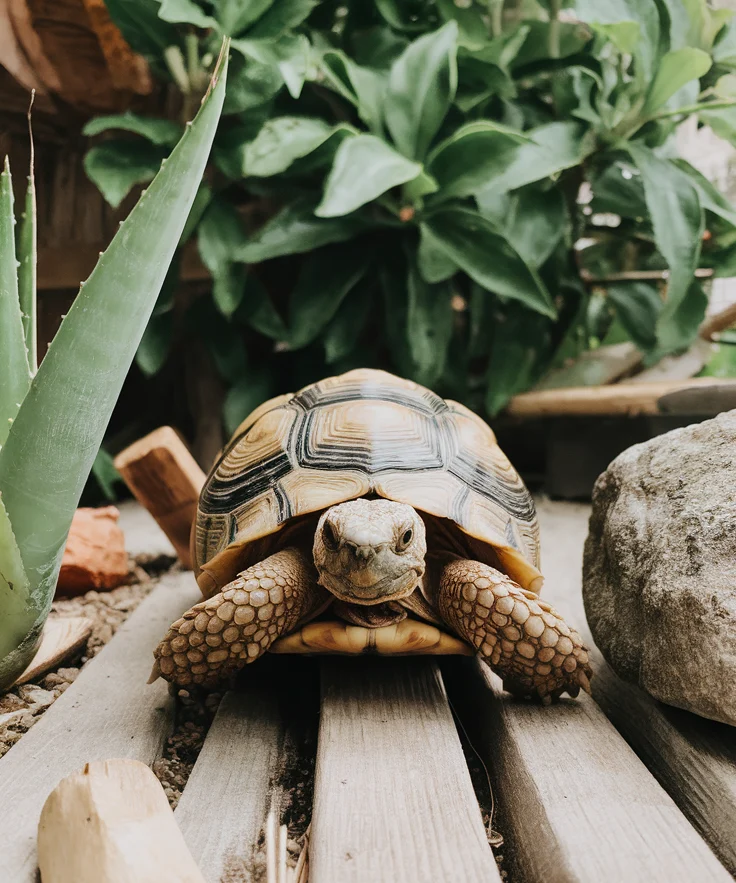The Gentle Giant: A Guide to Caring for a Pet Tortoise

Tortoises are unique and fascinating pets known for their slow-paced, gentle demeanor and impressive longevity. These reptiles can live for decades and are often seen as lifelong companions. Whether you’re a reptile enthusiast or looking for a pet that requires a different type of care, tortoises offer a rewarding experience. However, they do require specific conditions to thrive. Here’s everything you need to know about caring for a tortoise as a pet.
1. Why Tortoises Make Great Pets
Tortoises are appealing to those looking for a quiet, low-maintenance pet with interesting characteristics. Here are a few reasons why they make great pets:
- Longevity: Tortoises are some of the longest-living pets in the world. Many species can live 50 to 100 years or more, making them a companion for life and potentially even passed down through generations.
- Calm and Gentle: Tortoises are not aggressive by nature. They have a peaceful disposition and move slowly, which makes them great pets for people who prefer a more relaxed companion.
- Low Noise and Smell: Unlike many pets, tortoises do not make noise or have an odor. They are clean animals that require regular but low-maintenance care.
- Unique Personalities: While tortoises may seem aloof, many owners report that their tortoise has a distinct personality, from being curious and active to more shy and laid-back.
2. Choosing the Right Tortoise Species
There are many species of tortoises to choose from, and each one has its own care needs, size, and personality. Some of the most popular species kept as pets include:
- Russian Tortoise: A small species, reaching only about 6-8 inches in length. They are hardy and easy to care for, making them a great choice for beginners.
- Greek Tortoise: Slightly larger than the Russian tortoise, they are friendly and adapt well to life in captivity.
- Sulcata Tortoise: Also known as the African Spurred Tortoise, this is one of the largest species, growing up to 30 inches and weighing up to 100 pounds. They require significant space and commitment.
- Leopard Tortoise: Known for their beautiful shell pattern, these tortoises grow up to 18 inches long and have a docile temperament.
- Red-Footed Tortoise: A medium-sized tortoise, known for the red or orange scales on their legs, they are sociable and adapt well to captive environments.
3. Creating a Suitable Tortoise Habitat
Tortoises need a habitat that mimics their natural environment to stay healthy and active. Here’s what to consider when setting up a home for your tortoise:
- Outdoor vs. Indoor Enclosure: If you live in a suitable climate, an outdoor enclosure is ideal for tortoises. They love to roam and graze in natural sunlight. For indoor enclosures, ensure it’s large enough to give your tortoise room to move—at least 4×4 feet for smaller species and larger for bigger ones.
- Basking Area and Heat Source: Tortoises need a heat source to regulate their body temperature. Provide a basking area with a heat lamp to keep part of the enclosure at 90°F-95°F, while the cooler side should be around 70°F-75°F.
- UVB Lighting: If your tortoise is kept indoors, they need UVB lighting to synthesize vitamin D3, which is essential for calcium absorption and bone health.
- Substrate: Use a substrate that’s easy to clean and won’t cause impaction. Topsoil, coconut coir, or a mixture of soil and sand work well. Avoid using gravel, which can be ingested and cause blockages.
- Hide Box and Water: Tortoises like to have a place to retreat when they feel stressed. Provide a hide box or shelter in the enclosure. Also, provide a shallow water dish for drinking and soaking.
4. Diet and Nutrition for Tortoises
Tortoises are herbivores, and their diet should mimic what they would eat in the wild:
- Greens and Vegetables: The bulk of your tortoise’s diet should consist of dark leafy greens such as dandelion greens, collard greens, mustard greens, and kale. Other vegetables like squash, carrots, and bell peppers can be added.
- Fruits (Occasionally): Fruits like strawberries, apples, and melons can be given occasionally but should not be a large part of their diet due to the sugar content.
- Calcium Supplements: Dust their food with calcium powder (without phosphorus) regularly to support strong bones and prevent metabolic bone disease.
- Avoid High-Protein Foods: Tortoises are herbivores, so avoid feeding them animal proteins, grains, or foods high in oxalates like spinach and rhubarb, which can interfere with calcium absorption.
5. Handling and Socializing Your Tortoise
Tortoises are not as interactive as dogs or cats, but with gentle care, they can become accustomed to handling:
- Slow and Steady: Always handle your tortoise gently and support their body. Avoid picking them up too frequently, as this can cause stress.
- Respect Their Space: Some tortoises may not enjoy being handled and prefer to explore on their own. Observe their behavior and interact with them on their terms.
- Supervised Exploration: Allow your tortoise to explore safe areas outside of their enclosure, especially outdoors in a secure space where they can graze and roam.
6. Common Health Issues in Tortoises
Tortoises are generally hardy, but they can develop health problems if not properly cared for:
- Metabolic Bone Disease: This occurs when tortoises don’t receive enough calcium or UVB lighting. Symptoms include soft or misshapen shells and weak limbs.
- Respiratory Infections: If the humidity is too low or temperatures fluctuate, tortoises can develop respiratory infections. Signs include wheezing, mucus around the mouth or nose, and lethargy.
- Shell Rot: This is a bacterial or fungal infection that affects the shell, usually caused by poor hygiene or overly damp conditions. Regular cleaning and maintaining a dry habitat can prevent it.
Regular vet check-ups and proper care will ensure your tortoise lives a long, healthy life.
7. Fun Facts About Tortoises
- Old Souls: Tortoises are one of the longest-living animals on the planet. Some species have been known to live over 100 years!
- Great Memory: Despite their slow demeanor, tortoises have a good memory and can learn to recognize their owners.
- Shell Sensitivity: A tortoise’s shell is sensitive to touch, as it is connected to nerve endings. This means they can feel you touching their shell, so handle them gently.
Conclusion
Tortoises make calm and low-maintenance pets for those willing to provide the right care and commitment. With their long lifespan, unique personalities, and quiet nature, they are excellent companions for patient owners. By setting up a suitable habitat, feeding them a proper diet, and maintaining their health, you’ll ensure your tortoise thrives as a part of your family for many years to come.



